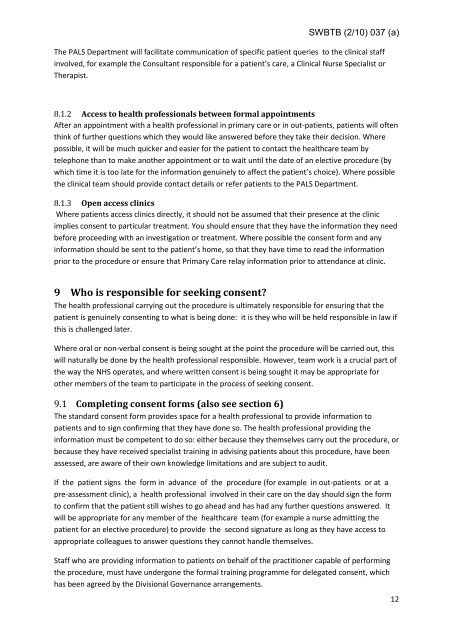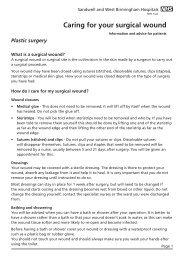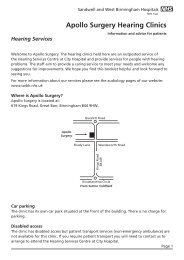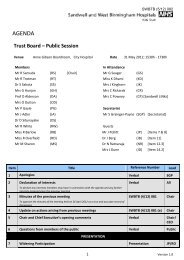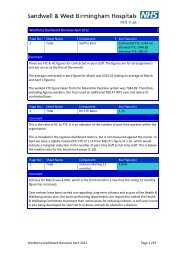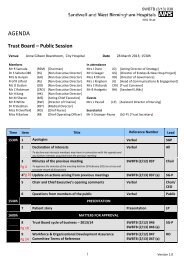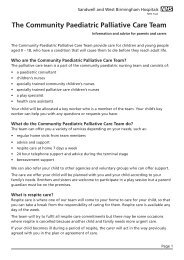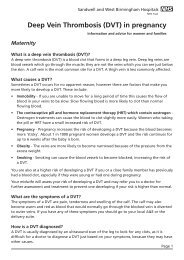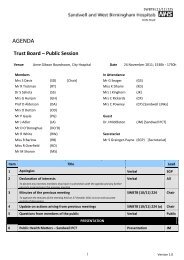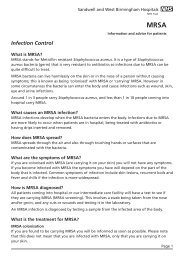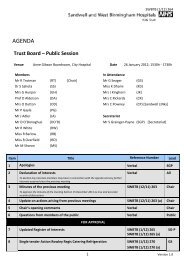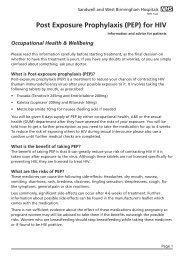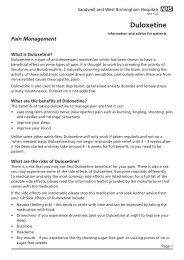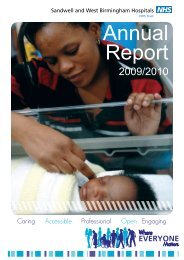Trust Board Febuary 2010 - Sandwell & West Birmingham Hospitals
Trust Board Febuary 2010 - Sandwell & West Birmingham Hospitals
Trust Board Febuary 2010 - Sandwell & West Birmingham Hospitals
Create successful ePaper yourself
Turn your PDF publications into a flip-book with our unique Google optimized e-Paper software.
SWBTB (2/10) 037 (a)<br />
The PALS Department will facilitate communication of specific patient queries to the clinical staff<br />
involved, for example the Consultant responsible for a patient’s care, a Clinical Nurse Specialist or<br />
Therapist.<br />
8.1.2 Access to health professionals between formal appointments<br />
After an appointment with a health professional in primary care or in out-patients, patients will often<br />
think of further questions which they would like answered before they take their decision. Where<br />
possible, it will be much quicker and easier for the patient to contact the healthcare team by<br />
telephone than to make another appointment or to wait until the date of an elective procedure (by<br />
which time it is too late for the information genuinely to affect the patient’s choice). Where possible<br />
the clinical team should provide contact details or refer patients to the PALS Department.<br />
8.1.3 Open access clinics<br />
Where patients access clinics directly, it should not be assumed that their presence at the clinic<br />
implies consent to particular treatment. You should ensure that they have the information they need<br />
before proceeding with an investigation or treatment. Where possible the consent form and any<br />
information should be sent to the patient’s home, so that they have time to read the information<br />
prior to the procedure or ensure that Primary Care relay information prior to attendance at clinic.<br />
9 Who is responsible for seeking consent?<br />
The health professional carrying out the procedure is ultimately responsible for ensuring that the<br />
patient is genuinely consenting to what is being done: it is they who will be held responsible in law if<br />
this is challenged later.<br />
Where oral or non-verbal consent is being sought at the point the procedure will be carried out, this<br />
will naturally be done by the health professional responsible. However, team work is a crucial part of<br />
the way the NHS operates, and where written consent is being sought it may be appropriate for<br />
other members of the team to participate in the process of seeking consent.<br />
9.1 Completing consent forms (also see section 6)<br />
The standard consent form provides space for a health professional to provide information to<br />
patients and to sign confirming that they have done so. The health professional providing the<br />
information must be competent to do so: either because they themselves carry out the procedure, or<br />
because they have received specialist training in advising patients about this procedure, have been<br />
assessed, are aware of their own knowledge limitations and are subject to audit.<br />
If the patient signs the form in advance of the procedure (for example in out-patients or at a<br />
pre-assessment clinic), a health professional involved in their care on the day should sign the form<br />
to confirm that the patient still wishes to go ahead and has had any further questions answered. It<br />
will be appropriate for any member of the healthcare team (for example a nurse admitting the<br />
patient for an elective procedure) to provide the second signature as long as they have access to<br />
appropriate colleagues to answer questions they cannot handle themselves.<br />
Staff who are providing information to patients on behalf of the practitioner capable of performing<br />
the procedure, must have undergone the formal training programme for delegated consent, which<br />
has been agreed by the Divisional Governance arrangements.<br />
12


